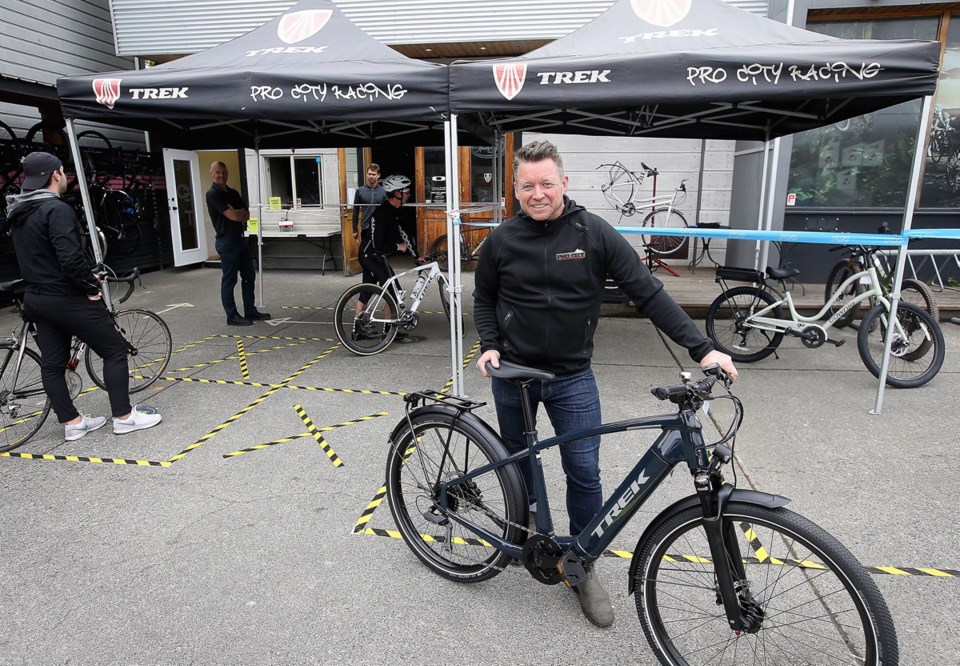We have asked local business people to describe how the COVID-19 pandemic is affecting them.
A commentary by the owner of Trek Bicycle Store Victoria.
As the pandemic unfolded, it proved to be one of the toughest problems we have faced as one of Victoria’s small businesses.
It was simply trying to figure out the right thing to do.
The Trek Bicycle Store in Vic West is a classic, locally owned independent business.
My partners and I are bike guys, not epidemiologists or crisis-management experts. As the coronavirus appeared, all we could do was gingerly take steps based on the guidance of health authorities, the comfort level of our staff and, frankly, just what felt correct.
Decision making is extremely hard when you know the right thing to do will drastically hurt your business financially.
Remember, the shift from normal life crept up on all of us, until it reached a tipping point. On March 15, my family and I all piled into the car for a spring break ski trip to Big White near Kelowna. We got as far as Swartz Bay and were actually driving up the ramp to board the ferry when my wife said: “This doesn’t feel right.”
No, it didn’t. So, six metres from boarding, we turned around on the ramp and headed home. B.C. Ferries was more than understanding of our decision and refunded us without question.
On March 16, my partners and I did what seemed best to protect both our staff and customers: We reduced the hours at our Catherine Street store, closed our smaller Harbour Road location, and asked people to respect physical distancing.
That last part proved tricky. Anxiety levels rose as some of those entering the store didn’t adjust. People in high-risk demographics were still coming in to browse; a tourist from hard-hit Seattle appeared fresh off the Coho to “take a look,” and it rattled us.
Basing our decision on how our employees were feeling, on March 21 we made the slightly knee-jerk reaction to close the store completely. We needed to regroup and form a plan for how to do business in an even more modified environment.
We didn’t know how long we would be closed for. We just knew we needed to change things for the safety of our staff and customers.
We were highly stressed, though. How long could we survive being closed? After a conversation with our accountant, we decided to reopen a day later — but with changes. We wouldn’t let customers in the store. Instead, we would greet them at the door and bring product to them. We wouldn’t accept bikes for repairs.
With business restricted, we then had to decide whether to lay off workers — people we’re close to, the ones with whom we share our days. We decided to wait to see what wage subsidies would be available, and kept everyone employed. Staff not completely comfortable with the situation were allowed to stay home.
Being deemed an essential service, we wanted to figure out a way to fix bikes. What we came up with, starting on March 24, was this:
We would take a bike in, completely spray it with a hospital-grade disinfectant, let it sit for two hours, power wash it with a degreaser and then quarantine the bicycle for two days. Our mechanics worked in gloves, washing their hands before and after every job.
Once they were finished with the repair, they would disinfect the bike again.
We also controlled who could enter the store (our bubble), thus reducing chances of exposure. Our staff did an amazing job of being respectful to each other, going straight home to self-isolate after each shift and washing their hands enough that their skin looked like an alligator’s back.
We also developed a system of greeting people outside the store by creating a roped-off separation between staff and customers. There were definitely a few drizzly mornings when I thought: “OK, how are we going to deal with the public outside in the rain?”
Fortunately, the weather has co-operated. (Needless to say, the Weather Network is still my most-visited website).
We continue to evolve and stay fluid as the situation changes. We have received amazing support from the community around us, with customers showing patience and gratitude to our staff through this whole time. The process of helping the public still remains awkward and exhausting, but we are so grateful to be open and doing business.



